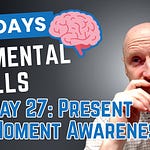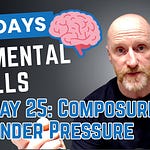I teach my clients the psychological skills, not only of peak performance in work and sport, but of everyday living and wellbeing. These are skills for life, not just for material gain and worldly success. Material gain and worldly success come as a consequence of developing these skills, so if a better life circumstance eludes you, start with this. Every day for the next 30 days, I’ll be bringing you a key aspect of these mental skills and explaining how you can develop them in yourself. They are fundamental to wellbeing and success in all fields of human endeavour, and the science of psychology has demonstrated this since the early 20th Century with the work of people like Norman Triplett and his study of elite cyclists (1898), and Robert Yerkes’ work on stress and arousal (1908).
The 9 Mental Skills
I recently wrote a lengthy article detailing the 9 Mental Skills. It breaks down the psychological and emotional components involved in peak human performance according to the highly respected psychologist, Dr Jack Lesyk1. I have modified the terminology somewhat, but the core principles remain the same. Here is a brief introduction to the 9 Mental Skills;
1. Mindset
At the core of the Mental Skills Model is Mindset. According to Carol Dweck, there are broadly speaking two types of mindset; fixed and growth. People with a fixed mindset believe that skills and abilities, personality and intelligence are fixed. You get what you have at birth and these remain largely unchanged throughout life. Those with growth oriented mindset believe these things can develop and grow, and that every failure is an opportunity.
2. Motivation
Ed Deci, one of the founders of Self Determination Theory, says that motivation is “the energy for action. It's what gets us up in the morning and moves us through the day”. Intrinsic motivation os the most powerful, and connecting with this motivational force is key to doing our best work. Over the next 30 days, I’ll explain how motivation works.
3. Goal Setting
Successful people set clear, realistic goals and hold themselves accountable, or they have others, such as coaches or peers, who help them with accountability. Goal-setting theory is foundational in its proposal for the attainment of goals, and highlights that specific, challenging goals enhance performance more than vague or easy ones. But beware; there is a dark side to goal setting.
4. People Skills
Relationships shape performance, whether in a team, with a coach, or against an opponent, on the stage, in a business; our capacity to read ourselves and others effectively is an essential skill. These skills include communication, empathy, compromise, leadership, and cooperation and are central to team cohesion and success. I’ll teach you about people skills.
5. Thinking Skills (self-talk)
How we talk to ourselves in the privacy of our own minds is a key factor in determining our behaviour. If you talk negatively to yourself, if you remind yourself of all the times you failed, you will be less inclined to take the action necessary to get you to where you want to be. Positive yet honest self-talk is vital. I’ll show you how to develop this skill.
6. Mental Imagery
Mental Imagery is a key skill in preparation for any event or occasion, and, in fact, for what we expect of tomorrow. It is the mental rehearsal required by performance, and requires the employment of all five physical senses. We rehearse every moment in the privacy of our own minds, so what are you rehearsing?
7. Stress and Anxiety Management
According to early studies, (Yerkes and Dodson, 1908), pressure and stress are not only a part of performance but are almost necessary. However, they become detrimental when they are out of our control. The goal isn’t to eliminate anxiety, but to manage it effectively. Over the next 30 Days, I’ll teach you the skills you need to manage anxiety.
8. Emotional Agility
According to psychologist and author, Susan David, “Emotional Agility helps us to navigate life’s twists and turns with self-acceptance, clear-sightedness, and an open mind”. It aligns with Steven C. Hayes’ concept of Acceptance & Commitment, in that accepting current conditions is the starting point for processing challenging life events. I’ll teach you the skill of Emotional Agility.
9. Focus & Concentration
Finally, we have Focus and Concentration. This skills can be found wherever we are in what Mihaly Csikszentmihalyi called, Flow State. When we perceive that our skills and experience can meet the challenge, Flow will most likely arise. There are ways we can cultivate Flow and I will tech you these over the next 30 days.
These are like mini-lectures, and they are free for your to access. Subscribe on Substack to get notified of each new video.
Mental Skills Basics Course
Suffering stress and anxiety is not a prerequisite for success in self-employment–there's a better way. Mental skills provide you with the means of coping effectively with difficulty and achieving your goals. I created the Mental Skills Basics Course to introduce business leaders, self-employed individuals, freelancers, consultants, and small business owners to the psychological and emotional skills associated with success.
Read more about Dr Jack Lesyk and his work at the Ohio Centre for Sports Psychology; https://www.sportpsych.org/qualifications











